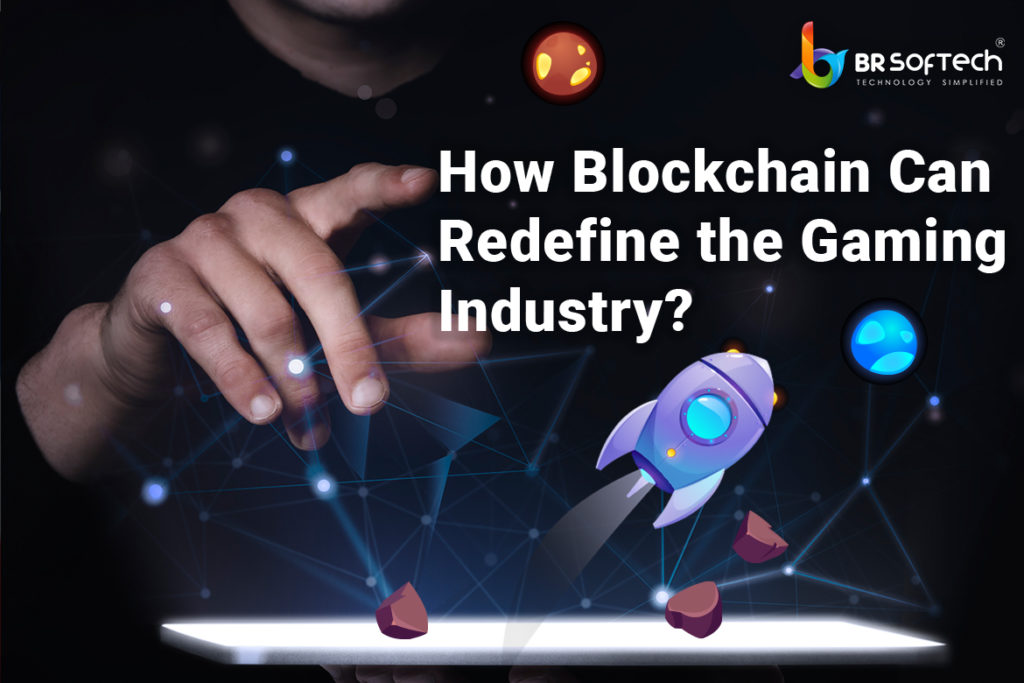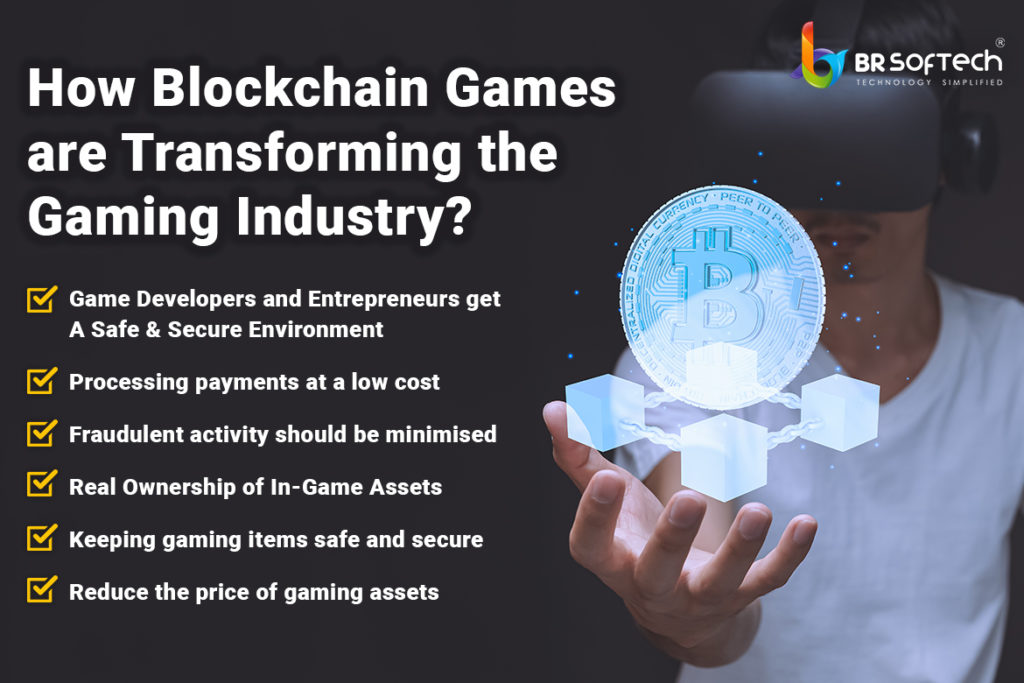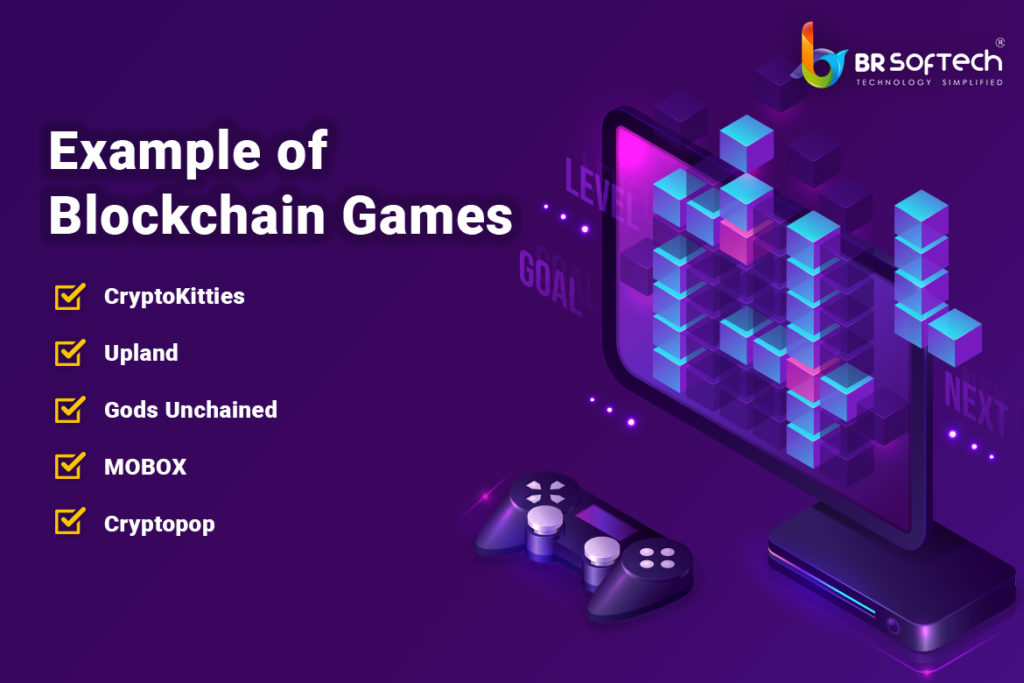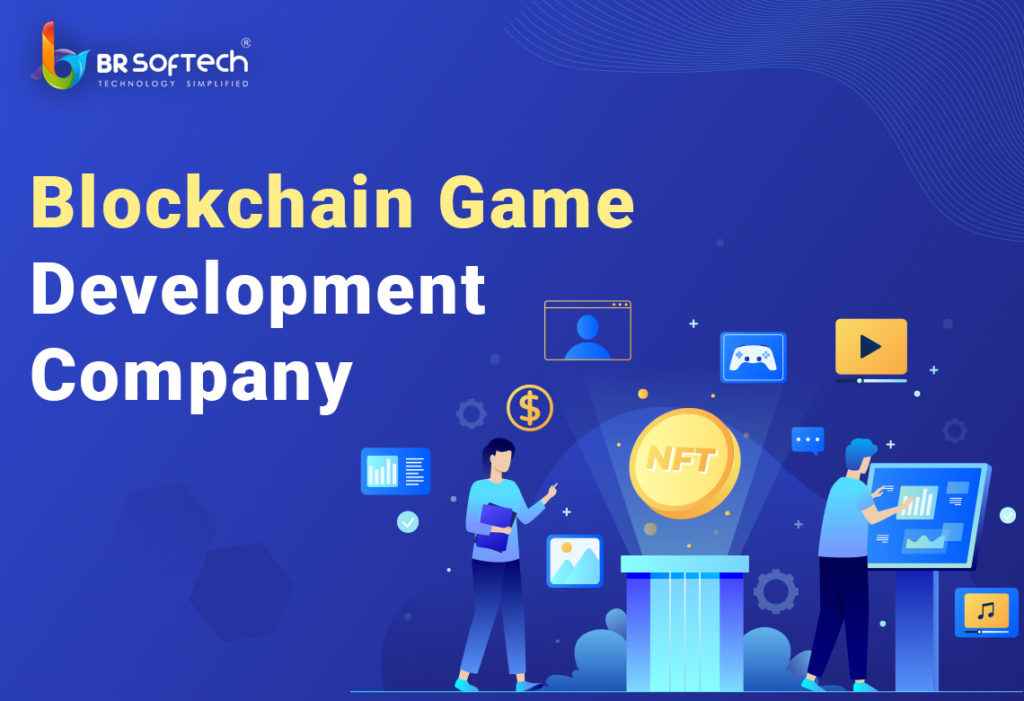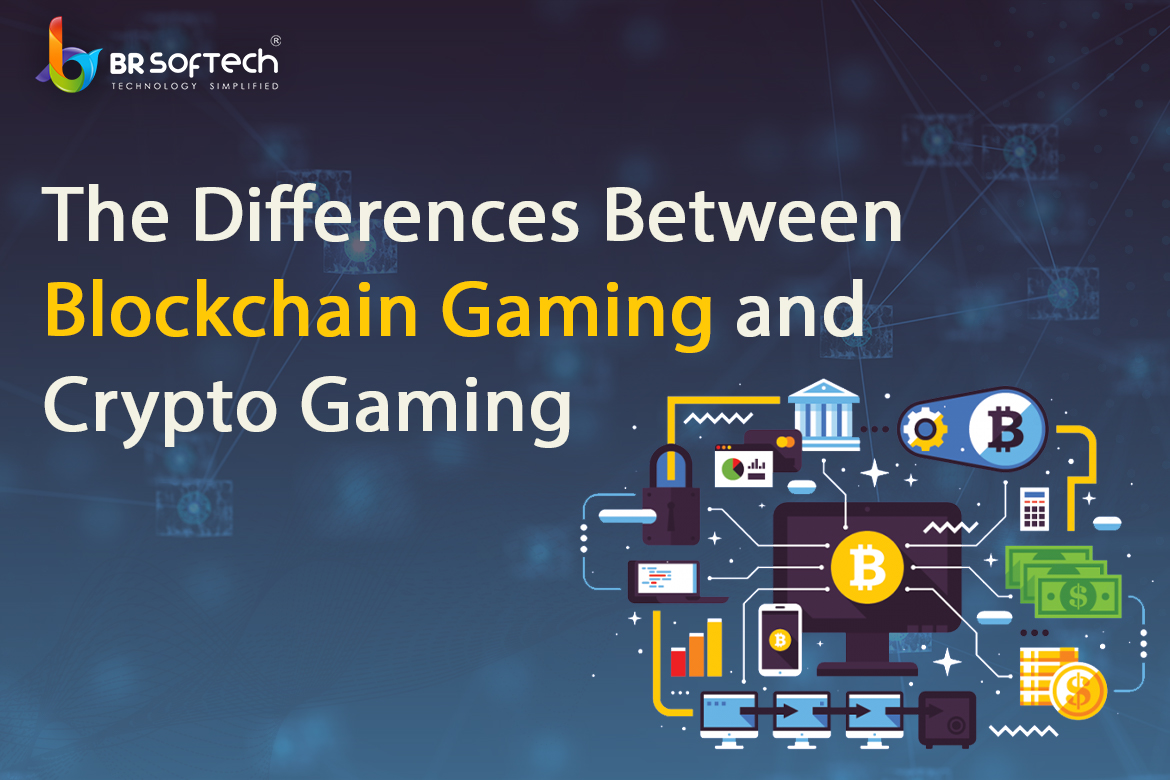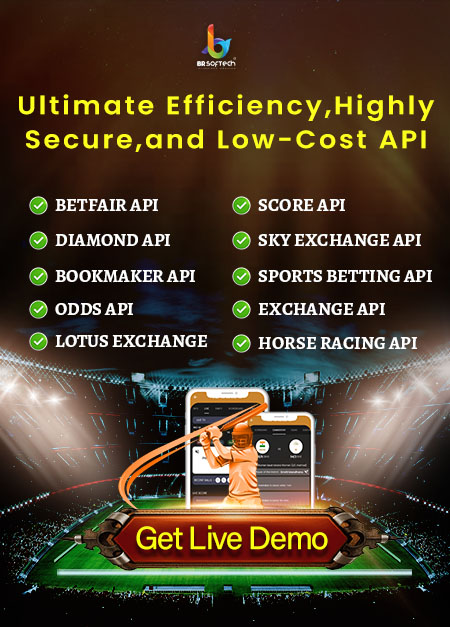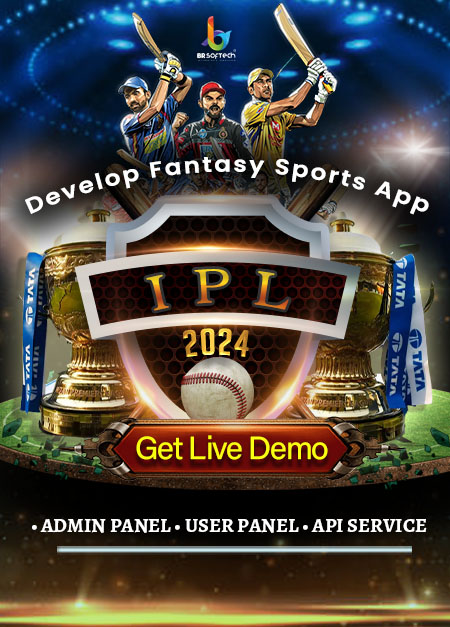The recent surge in popularity of blockchain game development can be attributed to the need to replace the flaws that exist in the existing fiat currency system with something new and revolutionary. In addition to transactions, blockchain for the gaming industry can be used for various other purposes, including decentralization.
What’s the reason? It will revolutionize the future creation, management, and ways of playing games thanks to blockchain technology. Using blockchain for gaming can lead to incredible things, as we will demonstrate. However, In this blog, we will discuss all the aspects of Blockchain in gaming industry.
What is Blockchain Gaming?
Instead of being controlled by a central authority, the decentralized blockchain system is owned and controlled by its users. On a gaming blockchain, you own a certain number of digital assets called NFTs, much like on a cryptocurrency blockchain, you own a certain number of crypto coins like Bitcoin, Ethereum, or Litecoin.
In the same way that cryptocurrency is yours to own, these game objects can be moved outside of the game and to a wallet.
Market Overview of Blockchain Gaming
It is estimated that 2.5 billion people will play games on mobile devices by this year, followed by 1.3 billion people who play on PCs, 0.8 billion people who play on consoles, and 2.5 billion people who play on mobile devices.
A 5.6% annual growth rate (2015-2023) is expected to push the global market to over 3 billion players by 2023. In addition, let’s take a look at the gaming market during the forecast period.
Blockchain Use Cases in Gaming Industry
High fees, unsafe data, centralized control, fraudulent activities, and hidden costs are some of the challenges that gamers and blockchain gaming companies face. The blockchain, however, solves many of these problems. Here’s a list of Blockchain use cases in the gaming industry.
1. Safe & Secure Ecosystem
Crypto token transactions are secured by blockchain platforms using powerful data encryption technologies. Data encryption techniques are almost impossible to hack using the technology we currently use. Additionally, hackers will not be able to destroy a decentralized blockchain network because there will be no single server to attack.
2. Low-Cost Payment Processing
It is possible to play games anywhere in the world. Games are played between players from different countries. Online gaming usually involves expensive fees for players. Fiat currencies can also be leveraged by players, but the transactions aren’t cost-effective.
Blockchain gaming companies also needed a solution for transferring assets without having to wait days for payment processing. Payments can be made instantly, regardless of location, across the globe with blockchain technology.
3. Minimal Frauds
Online fraud is most prevalent in the gaming industry. A growing number of technical vulnerabilities are being exploited by hackers. Because of this, the industry is always looking for ways to save money. Fraud can be eradicated and billions of dollars can be saved with blockchain technology. Create blockchain smart contracts that work well for your blockchain multiplayer game. Blockchain solutions also benefit from an open ledger of all transactions.
4. True Ownership of In-Game Assets
A key benefit of blockchain for gaming is that players own their assets, unlike non-blockchain games where you do not own your in-game purchases. Smart contracts govern transactions in the blockchain-based game, which makes all the difference.
When the conditions outlined in blockchain smart contracts are fulfilled, they are executed automatically and irreversibly. The smart contract players receive their public addresses upon buying in-game assets. The rules of blockchain for smart contracts can be viewed by all players, enabling complete transparency.
5. Keep Gaming Assets Safe & Secure
Hackers love centralized servers, no doubt about it! There is one stationary target for them, so they can easily hack them. The assets there can be theirs once they’ve broken through the encryption.
However, blockchain technology can change that. Digital collectables purchased in blockchain-based games can be securely stored in crypto wallets. As an example, you can secure your in-game assets by storing Bitcoin and Ether in an Enjin wallet, which can be found on the Enjin Coin website.
6. Reduced Prices of Gaming Assets
Blockchain Game developers may have a limited customer base due to the high prices of gaming items. In the digital market, gamers often seek stolen game items due to price.
Despite this, blockchain in the gaming industry facilitates micro-transactions at an affordable price. By reducing the price of their power-ups, developers are able to sell them at a low-profit margin. Additionally, online gamers can control how much they spend.
Benefits of Blockchain for Gaming
Today, blockchain technology is transforming the blockchain for gaming industry in a number of ways. Let’s take a look at the various benefits of blockchain gaming.
1. Asset Ownership
A major NFT use case is securing in-game items with blockchain solutions. ERC-721 is considered the best blockchain for gaming tokens and non-fungible tokens representing unique assets. A distributed network is able to maintain blockchain tokens for all types of assets.
2. Transparency
A game developer can create a self-sufficient economic system. It would be beneficial to have a level of transparency due to the decentralized structure.
3. Restoring People’s Power
Gaming will become more democratic with the inclusion of blockchain smart contracts. Players will be able to make decisions like hiring game developers to introduce voting rights according to the number of tokens.
4. Streamlined Payments
As a final benefit, games can reduce transaction costs and time by using the blockchain in place of centralized servers.
Blockchain is a great fit for gaming because of its liquidity and gamers’ familiarity with tokenization. The experts agree that blockchain solutions would be the best way to keep track of these transactions since many games allow users to buy in-game items using both virtual and real money.
Cryptocurrency and video games have a positive interaction thanks to blockchain technology. Several challenges in the gaming industry can be addressed with blockchain technology.
1. Enhanced Security
As a result of blockchain’s decentralized nature and highly effective encryption measures, hackers will have a difficult time breaking into data across servers.
Consequently, game entrepreneurs and developers are able to work in a secure environment, resulting in higher productivity. There are no servers to damage on a decentralized blockchain network, so hackers cannot take it down.
2. In-Game Asset Ownership
Blockchain technology can also facilitate in-game asset ownership by introducing more transparency and legislation into the gaming industry. Blockchain-based gaming will allow players to exchange scarce goods and profit through actual digital ownership.
As part of the blockchain-based game, all transactions are handled by blockchain smart contracts. The smart contract operates based on preprogrammed parameters and is irreversible. Due to this, all in-game assets purchased via smart contracts are immediately transferred to players’ public address accounts when a blockchain-based game is launched.
Furthermore, smart contracts function without a central authority. In-game assets cannot be changed at their public address, and private ownership of those assets cannot be changed. As long as they are owned by a game player, they will remain their property.
3. Intangible Asset Value Projections
As of December 6th, 2017, approximately $6.7 million had been invested in Crypto Kitties since the game was released on November 28th, 2017. Intangible digital collectables will be prioritized by players when an exciting blockchain game is created.
4. Video Game Control
Blockchain-based gaming networks cannot be modified. Consequently, network-deployed game series and programs won’t change in the future. Your blockchain gaming experience will not be compromised by downloading and installing video games from any location.
5. Interoperability
Blockchain for gaming mining procedures enables gamers and developers to build resource-rich games and apps and upgrade game versions. Creating an immersive app experience allows them to collaborate and earn tokens.
6. Cryptos Make In-Game Purchases Easier
Providing in-platform payments and cryptocurrency purchases to players can benefit you as a game developer. It will be possible for players to purchase game collectables instantly without having to wait for third-party payment providers to process their fiat currency transactions.
This opportunity is already being noticed by blockchain start-ups. As an example, Enjin provides game developers with the following framework:
- SDKs (software development kits)
- The wallet
- Plugins for games
- Payment gateways and other apps for managing virtual items.
The video game industry is also benefiting from blockchain platforms. In order to support transactions on their platform, they have developed an ERC20 token called ENJIN Coin.
Read Blog: Differences Between Blockchain Gaming and Crypto Gaming
7. Safe & Secure Environment for Developers & Entrepreneurs
Crypto token transactions are secured using highly powerful data encryption technologies such as private key-public keys. Using today’s computer technology, these techniques of data encryption are impossible to crack.
Decentralized blockchain platforms can’t be destroyed by hackers since there’s no one server to destroy. Databases are distributed among nodes, and each node has access to all the information in the database.
The blockchain prevents hackers from altering the transaction history of an existing network, and it prevents ‘Distributed Denial of Service attacks against these networks. In order to keep the network secure, blockchain networks use ‘Proof of Work’ (POW) or other consensus algorithms.
8. Secure Trading of In-Game Assets
The popularity of cryptocurrencies has made it easier for people to buy and sell crypto tokens securely. In-game assets can be bought and sold using digital currencies if your game is built on the blockchain.
Read Blog: How is Blockchain Technology Transforming the Gaming Industry?
Challenges in Blockchain Gaming
Although blockchains offer plenty of benefits for both users and businesses, developing a blockchain game is easier said than done. Let’s take a look at the drawbacks of blockchain in gaming industry.
1. Adaptability
Blockchain’s scalability is limited by the speed of centralized networks. Although a decentralized blockchain platform provides plenty of benefits, centralized servers tend to be much faster than some blockchains.
2. Demand
Since blockchain games are difficult to scale, their demand is significantly lower than their traditional counterparts. This is also one of the reasons why centralized gaming is still the norm. However, in the future when game developers overcome the restrictions of blockchain speeds, the demand is expected to rise.
3. Increasing centralization
It is not always the case that blockchain games are decentralized. Tokens are often distributed by a centralized server in some games.
4. Preventative maintenance
Since blockchain is not a popular concept in the gaming industry yet, it is often difficult for developers to raise funds to maintain blockchain games.
5. Availability of resources
In comparison to major centralized game developers, blockchain game developers face challenges due to small groups.
Blockchain Gaming Future: What Can We Expect?
The answer to the blockchain gaming future has its roots in the history of blockchain and the need for adoption drivers. Blockchain technology was developed by Satoshi Nakamoto. Since its creation in 2009, blockchain technology has promised disruption to industries. Starting with finance, the world soon realized how powerful blockchain technology is.
Wallets interacting with game-related smart contracts reached over 883,000 daily unique in August 2020, up from 804,000 in July. As more game developers unveil blockchain-based projects, these estimates have increased by over 100% since January.
There is a lot of potential in blockchain gaming: the global gaming industry is expected to grow from USD 173.70 billion in 2020 to USD 314.40 billion by 2026. Approximately one out of seven people on earth play online games, according to current estimates.
1. Best Blockchain Games
Blockchain in gaming still occupies a very niche market compared to traditional gaming. However, there are already hundreds of blockchain games available.
Here are some of the most popular:
2. Crypto Kitties
One of the first blockchain-based games is CryptoKitties, which was released in November 2017. Among the most popular games built on Ethereum, it has grown to become a rage.
Creating a new generation of cats (digital, of course) with unique traits to maximize their value is the goal of this new, play-to-earn game.
3. Upland
The Upland metaverse game is a property-trading game. Virtual properties are purchased, sold, traded, and built using real-world addresses in Upland. According to Upland, the cities of New York and San Francisco have been mapped.
In Upland, you can earn UPX coins by building properties and becoming a “digital landlord.”
4. Gods Unchained
God Unchained is based on the Ethereum blockchain which is considered the best blockchain for gaming. Play-to-earn opportunities are abundant in this fantasy trading game. There is no monetary investment required to begin playing this game, so players find it easy to begin.
In this game, $GOD is the token. (Gods Unchained cards) cannot be copied or modified. The Gods Unchained marketplace does not have to be used to trade them.
5. MOBOX
With Mobox, you can farm both yields and NFTs in a gaming metaverse. Play-to-earn and free-to-play options are available to its players. Using the Binance Smart Chain, this platform combines gaming with decentralized finance (DeFi).
6. CryptoPop
The Cryptopop game may seem familiar to you if you’ve played online games before. Cryptopop is also inspired by Candy Crush, another popular game.
In addition, players make more money by trading with other players on the in-game market. Popcorn and Ether are the main currencies of Cryptopop.
Read Blog: Blockchain Gaming- The Next Big Thing in Online Gaming Industry
Final Words
As a result of blockchain technology, the mobile gaming development industry can be rebuilt, and monopolistic practices can be ended.
The value-for-money proposition of digital items sold as in-game tokens tends to be higher than that of traditional purchases. While blockchain might take a few more years to become widely used in gaming, we can expect a more democratic, transparent, and secure environment in the near future. However, BR Softech is one of the leading Blockchain Gaming Companies that provide the best blockchain game development services to our customers. For more information regarding blockchain for the gaming industry, contact BR Softech.
Quick Contact Us :
Call/WhatsApp : +1-650-727-6690, +91-998-220-1414
Skype : bdm.br
Email: sales@brsoftech.com
Frequently Asked Questions(FAQs)
Q.1 What is Decentralized gaming?
Decentralized gaming refers to games that are hosted on a decentralized platform that offers enhanced security and transparency and even true ownership of in-game assets.
Q.2 Which Blockchain is best for game development?
There are plenty of blockchains that are excellent for game development. However, Ethereum is believed to be the best blockchain that facilitates game development.
Q.3 What game engines can be used for blockchain game development?
Several game engines are compatible with blockchain game development. However, Unity and Unreal Engine are the go-to engines of blockchain game developers.






